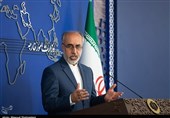Iran Raps Use of Cyber Advances as UCMs
TEHRAN (Tasnim) – Iran’s UN envoy took a swipe at the countries that employ information and communications technology (ICT) advances as tools for economic, political, or other coercive measures, stressing that the ICT environment must be used exclusively for peaceful purposes.
Saeed Iravani delivered a speech at a meeting of the UN Security Council on “Addressing the Evolving Threat in Cyberspace”, held in New York on June 20.
The text of his statement is as follows:
Thank you, Mr. President, for convening this open debate.
Information communication and technology (ICT) has become an integral part of global communication, business, and governance, offering numerous opportunities while at the same time introducing evolving threats.
Addressing evolving threats in the ICT environment requires a multifaceted approach encompassing technological, legal, and cooperative strategies.
Mr. President,
Iran has been the primary target and main victim of numerous cyberattacks on its infrastructure, significantly disrupting public services and governmental functions.
Clear examples include the Stuxnet and Duqu attacks on Iran's peaceful nuclear facilities, as well as cyberattacks on critical industrial infrastructures such as steel, petrochemical industries, and gas stations.
These malicious activities highlighted the potential for ICT environments to be weaponized to inflict damage on the infrastructures of states.
Given the complex nature of ICT governance, I would like to highlight the following points:
1. The primary responsibility for maintaining secure, safe, and trustworthy ICT rests with individual states. The prominent role and active involvement of states in the ICT environment governance at the global level, especially in policy and decision-making, must be enhanced and ensured. ICT governance should be developed in a manner that does not adversely affect the rights of states to determine their own development, governance, and legislation concerning the ICT environment. States must act responsibly and in accordance with fundamental principles of international law, particularly the Purposes and Principles of the United Nations.
2. The absence of universally legally binding norms for ICT remains a challenge. Current international law often lags behind the rapid pace of technological change, creating gaps that malicious actors exploit. Therefore, developing and enforcing international legally binding norms that address the specific features of the ICT environment is essential.
3. States must refrain from using ICT advances as tools for economic, political, or other coercive measures, including limiting or blocking measures against other states. They must also prevent and avoid abusing ICT-related supply chains under their control and jurisdiction, ensuring these do not develop vulnerabilities that compromise the sovereignty and data protection of other states. States must ensure appropriate measures for ICT companies and platforms with exterritorial impacts within their jurisdiction, to hold them accountable for their behavior in the ICT environment, especially if they violate the national sovereignty, security, and public order of other states.
4. We strongly believe that the ICT environment must be used exclusively for peaceful purposes. To this end, the UN must continue its central role through the OEWG(Open-ended Working Group) to develop legally binding obligations to prevent the use of ICTs for malicious purposes and maintain this domain for exclusive purposes.
I thank you.







